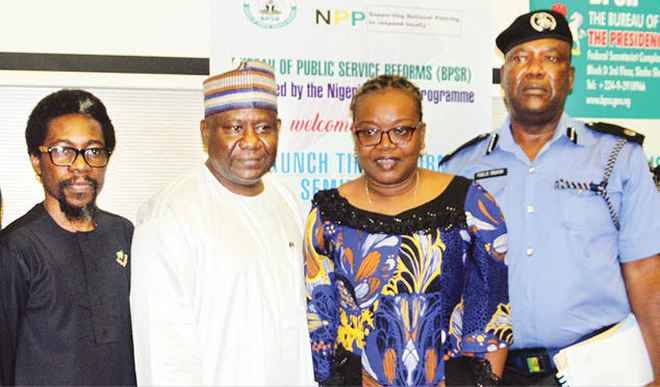Security: Day activists, police squared off on reforms
There have been calls from different quarters in recent times for the disbandment of the Special Anti-Robbery Squad (SARS) of the Nigeria Police Force, owing to lots of negative reports on the activities of the group. The July 2018 Lunch Time Reform Seminar on “The Effective Response of the Nigeria Police Force to the Curbing […]


There have been calls from different quarters in recent times for the disbandment of the Special Anti-Robbery Squad (SARS) of the Nigeria Police Force, owing to lots of negative reports on the activities of the group.
The July 2018 Lunch Time Reform Seminar on “The Effective Response of the Nigeria Police Force to the Curbing of Crime in Nigeria: The Role of Anti-Robbery Squad (SARS)” organised by the Bureau of Public Service Reforms (BPSR) and the Nigeria Policing Programme (NPP), brought together stakeholders who deliberated on the way forward for the police in Nigeria.
The Commissioner of Police, Federal Special Anti-Robbery Squad (SARS), Mr Haliru Gwandu, said the police was committed to reforming the SARS personnel for improved security in the country.
Gwandu, who was represented by an Assistant Commissioner of Police (ACP) Fidelis Okafor, clarified that SARS was a unit set up to counter violent crimes, cultism, robbery and kidnapping.
According to him, the Police authority is working hard on making SARS more accountable and reliable and this is yielding results as the police recovered 43 AK47 guns and 1 SMG in the first three months of 2018 alone.
He said that in a bid to achieve the reform, the CP had already designed a Standard Operational Procedure (SOP) to establish a friendly SARS that would meet the aspirations of the citizenry.
“Measures are being taken to make federal SARS more accountable, reliable and dependable by lecturing them weekly on the content of the SOP and their responsibilities. The duties of the unit are to curb violent crimes, robbery among others. On no account should SARS engage in handling civil and commercial cases.
“They are not to engage in ‘stop and search’ except there is a distress call. They must always appear in their uniforms and not be part of VIP convoy among others. Several trainings have also been carried out for the personnel on human rights and investigation and more is still being done for a better SARS,” he said.
On her part, the Team Lead, Nigeria Policing Programme (NPP), Mrs. Kemi Okenyodo, said the programme was supported by the UK government to ensure effective service delivery and accountability of Police to Nigerians.
She said that the seminar was organised on progressive ways of reforming the police force, particularly SARS, based on researches carried out on the activities and conduct of SARS.
“We are in the age and time when we are talking about community policing and building trust between government, its agencies and the citizens,” Okenyodo said.
The Acting Director General BPSR, Mr Dasuki Arabi, said safeguarding a country cannot be done only by the police, and so the SARS was set up to assist in achieving that.
“The prevalence of crime in Nigeria and its resultant negative consequence on the country’s economic and social image cannot be over-emphasized. Policing therefore cannot be left in the hands of security agencies alone,” Arabi said.
The trio of Mr. Segun Awosanya of the End-SARS Campiagn, Okey Nwaguma of the Network on Police Reform in Nigeria (NOPRIN) and Zeal Akaraiwe of the Graeme Blaque, said the nation owed its citizens a duty to ensure the welfare of the Police and that the Police too must be made to be loyal to the citizens and discharge their responsibilities professionally.
Mr Awosaya said the reality that led to the establishment of SARS in 1992 is no longer the reality now, hence the need to disband SARS and re-deploy SARS officers to other units where they can best discharge their responsibilities.
Akaraiwe on his part suggested that the Police be given smart phones with GPRS so they can be monitored, as part of measures to improve the discharge of their responsibilities.
